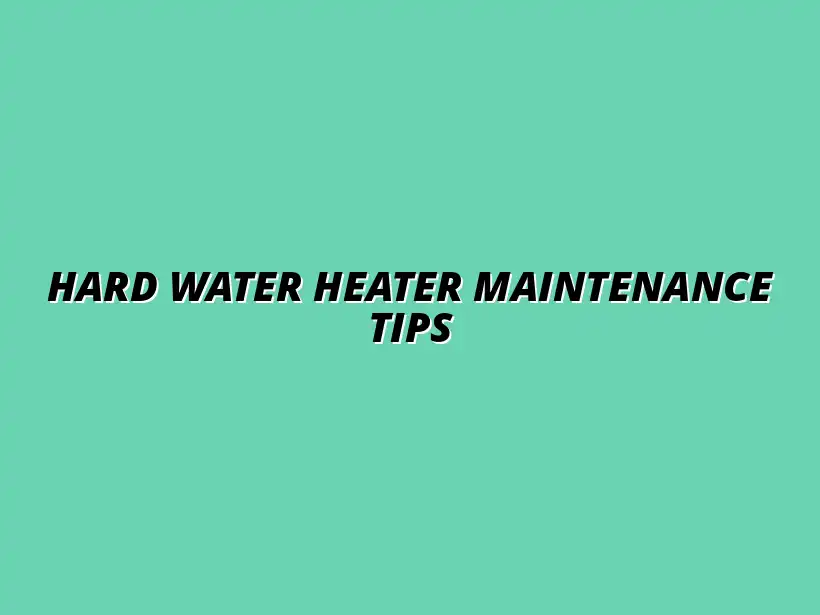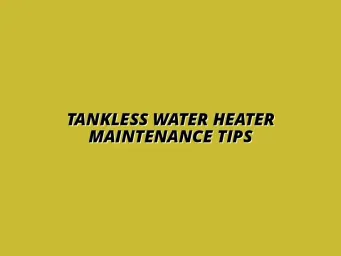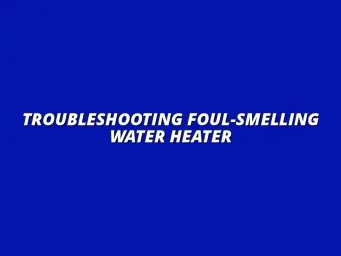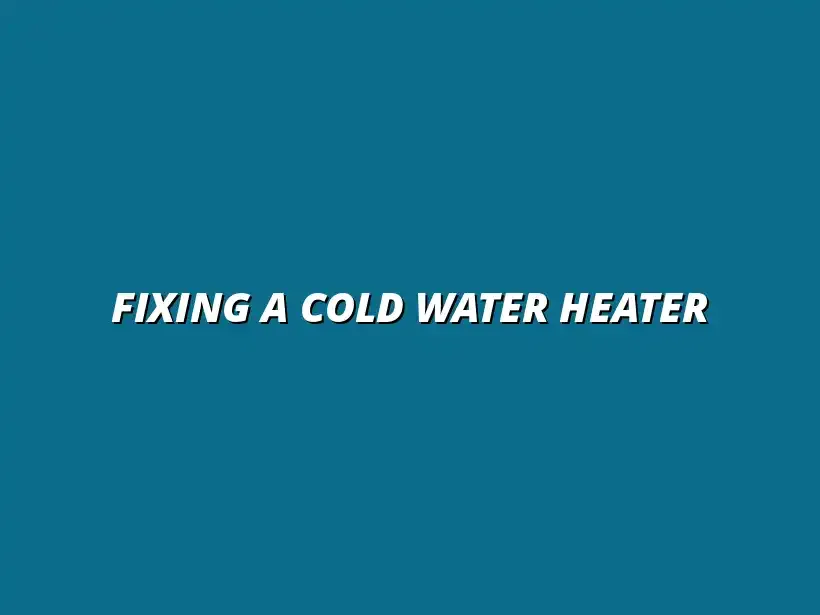
Hard Water Heater Maintenance Tips
Understanding the Impact of Hard Water on Water Heaters
Hard water is something many of us encounter, but it can have a significant impact on our plumbing systems, particularly water heaters. When water comes from the ground, it can pick up minerals like calcium and magnesium. This mineral-rich water is what we call hard water, and it can lead to various issues that may affect the efficiency and lifespan of your water heater.
It’s vital to understand how hard water interacts with your plumbing. Over time, the accumulation of these minerals can create scale buildup in your pipes and appliances. This buildup can cause clogs and inefficient heating, leading to higher energy bills and potential system failures. Regular maintenance, such as maintaining your water heater efficiently, is crucial for preventing these problems.
What is Hard Water and Its Effects on Plumbing?
Hard water is defined by its high mineral content, particularly calcium and magnesium. These minerals are naturally occurring, but when they accumulate, they can cause problems. For instance, hard water can lead to the formation of limescale, which can obstruct pipes and reduce flow.
Moreover, the effects of hard water extend beyond just the pipes. When hard water is heated, it can cause even more significant issues. The minerals tend to deposit onto heating elements and tank interiors, creating a layer of scale that reduces heat efficiency. This means your water heater has to work harder, which can lead to increased energy costs over time. To extend the life of your water heater, consider these tips to extend your water heater's lifespan.
Defining Hard Water and Its Mineral Composition
To better grasp the implications of hard water, let's look at its mineral makeup. Hard water primarily contains the following minerals:
- Calcium: This mineral comes from limestone and is the most common component of hard water.
- Magnesium: Often found alongside calcium, magnesium can also contribute to hardness.
- Iron: Sometimes present, iron can cause staining and additional buildup.
When these minerals are dissolved in water, they can lead to a range of plumbing challenges. It's essential to recognize that while hard water might be safe to drink, its effects on plumbing can lead to costly repairs and maintenance. Regular maintenance, such as an annual water heater inspection, can help prevent these issues.
Common Issues Caused by Hard Water in Water Heaters
Hard water can create several challenges for water heaters. Some common issues include:
- Scale Buildup: This mineral buildup can coat heating elements, affecting their efficiency.
- Reduced Lifespan: The constant strain from scale can lead to premature wear and tear.
- Increased Energy Bills: A less efficient heater requires more energy to operate effectively.
By understanding these issues, homeowners can take proactive steps to mitigate hard water's effects. Being informed is the first step toward protecting your plumbing investments! For essential kitchen plumbing maintenance, check out these essential tips.
Essential Water Heater Maintenance Tips for Hard Water Areas
Taking care of your water heater is crucial, especially in areas with hard water. Regular maintenance can help you avoid the problems mentioned earlier. By implementing a few key strategies, you can ensure your water heater runs smoothly and lasts longer.
Among the essential maintenance tips, routine inspections and timely flushing of the tank are vital. Additionally, being aware of the signs that your water heater needs maintenance can prevent much bigger issues down the line. Learning how to flush your water heater easily is a key maintenance strategy.
Regular Maintenance Checks to Prevent Hard Water Damage
Regular maintenance is essential in preventing damage from hard water. Conducting periodic checks can help identify problems early on. Some maintenance tasks include:
- Visual Inspections: Check for leaks or signs of corrosion.
- Temperature Settings: Ensure it's set to the recommended levels.
- Flushing the Tank: Remove sediment buildup to maintain efficiency.
By staying on top of these checks, you can significantly reduce the impact of hard water on your water heater and enhance its performance. For essential bathroom plumbing maintenance tips, see here.
Importance of Routine Inspections for Water Heaters
Routine inspections play a vital role in ensuring your water heater operates efficiently. Regular checks can help you catch small problems before they become major issues, saving you time and money. Plus, knowing how to identify maintenance needs is a critical skill for homeowners.
During these inspections, look for:
- Unusual noises coming from the heater
- Unexplained spikes in your water bill
- Discoloration or unusual odor in the water
By addressing these signs early, you can help extend the life of your water heater and keep your home’s water supply in top shape. If you need a plumber in Billesley, Birmingham, check out this link.
Signs Your Water Heater Needs Maintenance
It’s important to recognize when your water heater needs attention. Here are some common signs that indicate maintenance is due:
- Leaking Water: Look for moisture around the base of the heater.
- Inconsistent Water Temperature: If your water isn’t heating evenly, it may need a check-up.
- Strange Noises: Banging or popping sounds can indicate sediment buildup.
Being observant can save you from unexpected breakdowns and costly repairs!
Flushing the Water Heater: A Key Maintenance Strategy
Flushing your water heater is a crucial maintenance step, especially if you live in an area with hard water. This process removes sediment buildup and helps maintain efficiency. Regular flushing can prevent the issues associated with hard water, extending the life of your heater.
To ensure you’re flushing your water heater effectively, follow a systematic approach. A well-planned flushing helps keep your water heater in optimal condition!
Step-by-Step Guide to Flushing Your Water Heater
Flushing your water heater can seem daunting, but it’s quite straightforward. Here's how you can do it:
- Turn off the power or gas supply to the heater.
- Connect a garden hose to the drain valve and place the other end in a bucket.
- Open the drain valve and let the water flow out until it runs clear.
- Close the valve, remove the hose, and turn the power or gas back on.
With regular flushing, your heater will run more efficiently, and you’ll reduce the chances of hard water damage!
How Often Should You Flush Your Water Heater in Hard Water Areas?
The frequency of flushing your water heater largely depends on your water quality. In areas with hard water, I recommend flushing your heater every 6 months to a year. If you notice significant mineral buildup or reduced efficiency, it might be worth doing it more often.
By adhering to these guidelines, you can keep your water heater functioning well and avoid the hassles that come with hard water!
Using Water Softening Solutions to Protect Your Heater
Implementing water softening solutions is another effective way to combat the effects of hard water on your water heater. These systems can help reduce the mineral content in your water, preventing scale buildup and helping your heater operate more efficiently.
There are various types of water softeners available, and selecting the right one can make a significant difference. I’ve found that investing in a quality water softener can save you money in the long run by prolonging your heater's life and reducing maintenance needs.
Benefits of Installing a Water Softener
Installing a water softener offers several advantages:
- Reduced Scale Buildup: Helps prevent mineral deposits in your pipes and appliances.
- Improved Appliance Efficiency: Softened water helps your water heater operate more effectively.
- Longer Lifespan: Prevents wear and tear on your plumbing systems.
By choosing a water softener, you’re investing in the long-term health of your home’s plumbing!
Types of Water Softening Systems Suitable for Homes
There are several types of water softening systems available on the market. Some popular options include:
- Ion Exchange Systems: These change hard minerals to sodium or potassium.
- Salt-Free Systems: They condition water without adding salt, making them eco-friendly.
- Magnetic Softener Systems: These use magnets to change the properties of minerals.
Choosing the right system depends on your home’s specific needs and budget. It’s worth doing some research to find what works best!
Choosing the Right Water Heater for Hard Water Conditions
When looking for a new water heater, it’s essential to consider the unique challenges that hard water presents. Selecting a model designed to mitigate these issues can save you time, trouble, and money.
There are several types of water heaters that work better in hard water conditions. Understanding the features that combat hardness can help you make an informed decision!
Best Water Heater Types for Hard Water Areas
Some water heater types are better equipped to handle hard water. Here are a few worth considering:
- Tankless Water Heaters: They typically have less accumulation since they heat water on demand.
- High-Efficiency Models: These often include advanced technology to reduce scale buildup.
- Water Heaters with Built-in Anode Rods: These rods help combat corrosion due to hard water.
By selecting the appropriate type, you can enhance your water heater's longevity and performance!
Features to Look for in a Water Heater to Combat Hard Water
When choosing a water heater, consider specific features that help combat hard water:
- Self-Cleaning Mechanisms: These reduce sediment buildup automatically.
- Enhanced Insulation: Minimizes energy loss and helps maintain a stable temperature.
- Corrosion-Resistant Materials: Improves durability against hard water effects.
By focusing on these features, you can significantly improve the performance and lifespan of your water heater!
Professional Services vs. DIY Maintenance: What to Consider
Deciding whether to hire a professional or tackle maintenance yourself can be tricky. Both options have their pros and cons, depending on your experience and comfort level with home repairs.
For those who prefer a hands-on approach, DIY maintenance can save money. However, hiring a professional can ensure that your water heater receives the proper care and expertise it needs!
Benefits of Hiring a Professional for Water Heater Maintenance
There are many benefits to hiring a professional instead of doing it yourself:
- Expertise: Professionals have the knowledge and experience to identify problems quickly.
- Time-Saving: They can complete maintenance tasks more efficiently than most homeowners.
- Warranty Protection: Many warranties require professional maintenance for coverage.
Choosing to hire a professional can ultimately provide peace of mind and ensure your water heater runs smoothly!
DIY Maintenance Tips for the Handy Homeowner
If you're a handy homeowner, there are several maintenance tasks you can perform yourself. Remember to always prioritize safety! Here are some tips:
- Read the Manual: Familiarize yourself with your specific water heater model.
- Keep an Eye on the Temperature: Make sure it’s set to the recommended temperature for efficiency.
- Regularly Inspect for Leaks: Check around the heater for signs of leakage or corrosion.
With a little effort and attention, you can keep your water heater in great condition and extend its life!
Addressing Common Questions about Water Heater Maintenance in Hard Water Areas
How Can Hard Water Affect the Lifespan of a Water Heater?
Hard water can significantly shorten the lifespan of your water heater. The minerals in hard water, such as calcium and magnesium, can build up inside the tank over time. This buildup leads to inefficiencies and potential breakdowns, which can be costly!
In fact, when sediment accumulates, it not only reduces heating efficiency, but it can also cause overheating and damage to essential components. As a result, you might find yourself needing to replace your water heater much sooner than expected.
- Increased Maintenance Needs: Hard water requires more frequent maintenance.
- Higher Energy Bills: Less efficient heating leads to greater energy consumption.
- Early Replacement: Sediment buildup can cause premature failure of the heater.
What Are the Costs Associated with Hard Water Treatment?
Treating hard water can involve various costs, depending on the solution you choose. Some homeowners opt for water softening systems, while others may prefer routine maintenance to manage the effects. Understanding these costs can help you make an informed decision about the best approach for your home!
Here’s a breakdown of potential expenses you may encounter:
- Water Softener Installation: $400 - $3,000 (depending on the system).
- Regular Maintenance: $100 - $300 per year for inspections and servicing.
- Flushing Services: $75 - $150 each time, if hiring a professional.
Summarizing Effective Strategies for Water Heater Longevity
Recap of Key Maintenance Tips for Hard Water Issues
To ensure your water heater stays in great shape despite hard water challenges, it's important to stay proactive. Regular maintenance and the right equipment can go a long way! Here’s a quick recap of strategies you can adopt:
- Conduct routine inspections to catch problems early.
- Flush your water heater periodically to remove sediment.
- Consider installing a water softener for long-term protection.
By focusing on these maintenance practices, you can help extend the life of your heater and improve its efficiency!
Final Thoughts on Ensuring Efficient Operation of Water Heaters
Maintaining your water heater in hard water areas is crucial for optimal performance. By understanding the unique challenges hard water presents, you can take steps to mitigate its effects. Remember, the right maintenance can save you time and money in the long run!
Investing in regular checks and protective solutions will pay off. You’ll enjoy reliable hot water and lower energy costs, which are always a win!
Encouraging Readers to Take Action and Maintain Their Water Heaters
Resources for Further Reading on Hard Water Solutions
If you're looking for more information on handling hard water issues, there are plenty of resources available! Check out articles, guides, and expert recommendations to deepen your understanding. Here’s a starting list:
- Local plumbing associations for tips and tricks.
- Home improvement websites with customer reviews on water softeners.
- Blogs that focus on DIY maintenance for water heaters.
Inviting Readers to Share Their Experiences and Tips
Your experiences with hard water and water heater maintenance could be invaluable to others! I invite you to share your stories or tips that have helped you. Whether it’s a trick for cleaning or advice on selecting the right water softener, your input can make a difference!
Let’s create a community where we can learn from one another and tackle hard water challenges together. Feel free to leave a comment or connect with others who share your interests!




